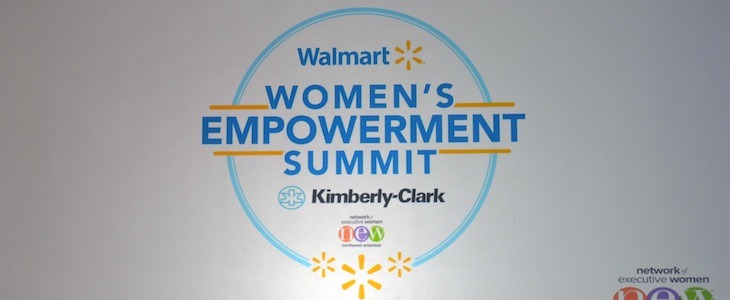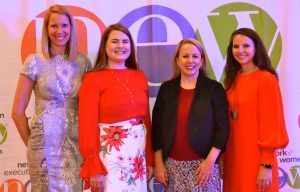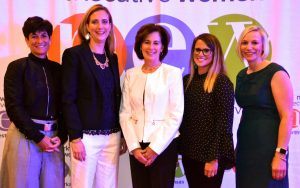Leadership lessons, technology challenges part of Women’s Empowerment Summit
by June 21, 2018 4:28 pm 1,329 views

The Walmart Women’s Empowerment Summit was hosted by the Network of Executive Women, a national organization with an NWA chapter of more than 1,000 members.
Trusting your “gut” in making business changes, putting the right people in the right jobs, and pursuing “inclusive” leadership were just a few of the topics covered Thursday (June 21) at the Walmart Women’s Empowerment Summit.
The event, hosted by the Network of Executive Women (NEW), was attended by 500 women business leaders and held at the John Q. Hammons Center in Rogers on Thursday morning as part of the NWA Championship Week. Formerly known as the Women’s Day at the LPGA, the event was expanded to include multiple speakers around the theme “Sparking Positive Change Together.” It was presented by Walmart and Kimberly-Clark.
The morning began with a panel discussion including Jerry Spencer, Walmart senior vice president of realty; Jacqui Canney, Walmart executive vice president of global people; and Kim Underhill, Kimberly-Clark group president, North America. Rebecca Dunphey, Kimberly-Clark North American president of baby and child care, moderated the discussion.
When asked to share a story from their career about positive change, Canney told how in January, after listening to the desires of company associates, Walmart began to extend parental adoptive and maternity benefits to all associates. It was “a game-changer for our company to attract and retain the best talent, but we were also able to spark change so that other companies in the U.S. did the same thing. I’m really proud of that,” Canney said.
Spencer shared a story about the times he toured stores with Sam Walton and the inclusive way Walton initiated change there. “He would have an idea for change that he would talk about and why we needed to make change and why it would move the company forward,” Spencer said. That taught Spencer that leaders need to spark positive change in an inclusive way.
Underhill told about a leadership position she had several years ago when she was tasked with “fixing” the company’s declining European business. That meant turning over 75 percent of leadership in three months. “We had people sitting in the business that didn’t believe that things needed to happen, but yet when you looked at the numbers it was hard to ignore that things were a little bit in trouble,” she said.
What Underhill learned was, “when you have a gut feel about talent, you should just make it.” The change for her was getting the right people on the team who were ready to make change, “because without that, we had no momentum.” Her advice for attendees was to get the right people around you to make the change, so that your job will be easier.

In answer to a question about coaching and mentoring, Underhill and Spencer talked about “reverse mentoring” where leaders learn from those who report to them.
THE CHALLENGE OF FAST-PACED TECHNOLOGY
Dunphey asked Canney about how the rapidly changing retail environment affects her job in leading the people division at Walmart and what keeps her up at night as a result. Dunphey also asked how Walmart needs to change to make sure it wins in the ever-changing environment. Canney said what keeps her up at night and what excites her are the same thing: how technology is impacting people personally and professionally.
“In retail it’s impacting the industry significantly in how people shop, where they want to shop, what they buy, how often they buy,” she said.
At Walmart, she sees a need to re-skill associates so they are prepared and confident to meet those challenges. To address that, Walmart is streaming technology to U.S. stores so processes can be changed much quicker.
“Our associates are gaining confidence and retail skills and the ability to serve our customers in new ways and as their confidence rises, so are our sales and net profits,” Canney said. “Our associates are better prepared, our customers are happier and then our business results come.”
Canney also mentioned the roll out in May of the program that allows associates to get college degrees for working at Walmart. Underhill addressed how to lead people to embrace change, versus resisting it. She said it starts with helping people understand why the change is needed.
“There are too many case studies where the company didn’t evolve or grow and therefore they don’t exist anymore,” she said. “I used to work for a guy that said, ‘hope is not a strategy.’”
Once you prove the why, she said, you paint a vision of what could be.
“If you can get good people that are ready with that mindset, I’ve seen some really bad situations turn into some great business environments and great business results,” Underhill said.

Dunphey asked how to find the right balance between spending time getting things done versus developing people. Canney shared that with mid-year reviews coming up their people team will focus on “What are you doing to grow the business? What are you doing to grow your team? What are doing to grow yourself? and How are you being inclusive in how you’re doing that?” She said that boils down to treating other people the way that you want to be treated.
GENERATIONAL APPROACH
Underhill believes teams want to know what the leader is thinking and want to know who they are outside of work. So, she does “straight talks,” where she randomly meets with 10 to 15 people from her team in one room, with no agenda, and they can ask her any questions.
“I learn so much about the pulse of the organization by the nature of the questions they’re asking me,” she said.
Another hot topic is to navigate and be successful across multiple generations in the workplace, Dunphey said. Spencer said leadership should focus on what the generations have in common and that certain things transcend all generations.
“We all want to feel respected. We all want to feel valued. We all want to enjoy, respect and admire the company we work for. We want to feel like we’re contributing and producing good results,” he said.
Spencer said he agreed with Ken Blanchard, in his book “The Heart of a Leader”, who said “If you help people learn to produce, they’re going to feel good about themselves.” Included in that is helping people find their voice and use it and for leadership to listen.
For Spencer, “success at work has never been defined by what we wear, what time we come to work, if we work 70 hours a week or not, if we use technology. I think all of those things are things we can work around as we get to know and understand our workforce and the people that are on our team, and align against a common objective which is to produce good results.”
Underhill agreed and said she doesn’t care when people work.
“It’s not about the hours you spend in the office, it’s about us accomplishing our goals together as a team.”
Canney said in her research there are basically five skills important no matter your age or location. They are: data driven decision making capabilities; digital literacy; flexibility at your core so that you know roles change and work changes; a growth mindset and empathy for those you work with and for customers that you serve.
‘SHOW UP CONFIDENT’
Latriece Watkins, Walmart senior vice president of consumables merchandising, was the keynote for the event, and answered questions posed by Brinkley Beever, a recent high school graduate and First Tee ambassador. Beever asked Watkins’ opinion on the role confidence plays in getting ahead. Watkins said you have to do the hard work, show up prepared and be sure of the information you have to give people.
“Confidence is probably the first lesson I learned working at Walmart. I had a boss at that time who said, ‘you’ve got to show up confident, or not at all. Because people can convince you of almost anything if you don’t’ believe what you’re telling them.’”
When asked what she would change about the workplace, Watkins said she would “like to change the fact that we’re still talking about making the case for diversity of women and people of color. Can we make a plan, instead of a case? Let’s just start changing something. Let’s have a plan and go do something different.”
Watkins said she has four pieces of advice to help women support other women in the workplace: tell people the truth and be their cheerleader and their coach; show authenticity so that people will know what they’re going to get with you when they interact with you; have empathy for others; and spread a little joy.
Beever is starting college in the fall, and so she asked Watkins for tips on planning a career. Watkins said to have fun and make memories in college and she should always listen to her mother.
“It’s never too early to define what your purpose is or to start leaving a legacy,” Watkins said. “And be fantastic. I say, shoot for fantastic, if you miss it, you’ll still be awesome.”
The event also included four “pop up” speakers. Celia Swanson, retired Walmart executive spoke on “Leading with Grace.” Sandra MacQuillan, Kimberly Clark chief supply chain officer, spoke on “Leading through Transformational Change.” Savvy Shields, Miss America 2017, spoke on “Leading with Confidence”. “Mentoring for Male and Female Leadership” was Linqia co-founder and Nestle vice president Maria Sipka’s topic.
NEW is a national organization with a mission “to advance women, grow business and transform our industry’s workplace through the power of our community.” The NWA chapter, formed in 2004, has 1,000 members.
